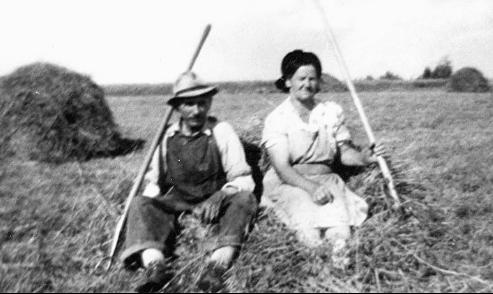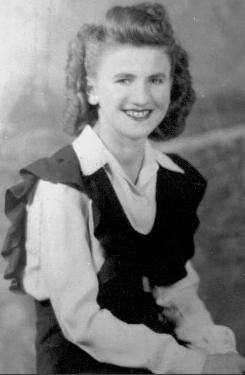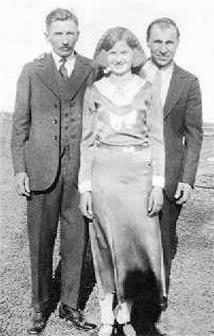From Tenant Farmer in Ukraine to Landowner near Hearst in 1912.
By Ken, Carole and Eldon Sprickerhoff.
Davitsky, Zinko & Zenovia
Children: Sergei, Marina, Nick, Fred, Sagny, Mary, Sophie, Annie, Sam, Helen
Hearst Relatives: Bosnick, Sprickerhoff.
Let's start with Feodor Daviskiba and his wife Stephanina Protzenko in Zelenij Rog, a small village south of Kiev, east of Uman, Russia, now Ukraine. Feodor and Stephanina had four boys and three girls. The daughters' names were Hawrilo, Warka and Oprasia. The sons, Zinko, Samoil, Silefon and Ivan, all came to Hearst, Ontario, as men in their twenties in 1912-13.

Zinko and Zenovia Davitsky
The Daviskiba name was anglicized to Davitsky. They emigrated to escape slaving and starving as tenants on landlord's land. There was said to be available land for clearing and farming in Northern Ontario. Zinko sailed from Libau on a ship named the S.S. Estonia and arrived in Halifax on March 15, 1912, probably coming north by train. His wife, Zenovia, and young son, Sergei, followed a year or two later.
Zinko and his brother, Silefon (also known as John), built a boarding house on the main street of Hearst (George Street) where Ted Wilson's store is now situated and next to what used to be West and Co. The boarding house burned down about a year after it was built and, having no insurance, they lost everything. Zinko then bought a farm and moved to Hallewood, now Hallebourg (Lot 7, Concession 9, Kendall Township).
Zinko Davitsky had married Zenovia Shewchuk in 1906, in Zelenij Rog, Russia. They had eleven children. Zinko was short, about 5 feet 5 inches tall, with dark hair and a small moustache. I look at the picture that is in my possession and see the man there sitting with his wife and children, proud of his family. The picture (I am told) was taken in front of the house, or was it the log cabin, with a grey sheet to hide the poverty, a common practice during the Great Depression. This mini-second frozen in time tells of the pain, the hunger, the pride and the endurance of this noble race.
Zinko loved his family. He wanted them to be the very best and would embarrass them by great praise for something that they had done, things like good work in school. Their work would be paraded out to be shown to visitors, to the chagrin of the embarrassed and shy child. He was protective of them, but stern, too, judging them and administering punishment to errant family members. He was the patriarch, but was also the first to praise.

Davitsky children
He was a sickly man with a terrible history of asthmatic problems, which bothered him until he was an old man and then miraculously cleared up. Many times in his life his breathing was forced and laboured, waking up at night in the stuffy, pollen-rich, dusty air fighting for breath. It was a sickness enhanced by cold, wet springs and freezing, bone-chilling winters. The colds and pneumonia that penetrated every aspect of this poor man's life would have stopped many a man.

Sam Bosnick & Sagny (Davitsky) Bosnick, about 1947
I (Ken) observed many immigrants that came to the north to make their fortune, to scoop up the gold that was supposedly laying around waiting to be picked up. I didn't know Zinko in my youth, but I watched men like him, good men, get caught up in the throes of the terrible Hungry Thirties. Men, who when the hard times came, took the bit by the teeth along with their wives and ran with it. These men who'd come to a strange land to be rejected by the locals. These men who did not speak the language, could not communicate, far from people of their own race, many leaving wives and sweethearts back in their homeland, never to see them again. Into bush camps they went, or road gangs, many turning to the bottle and the ladies of the night, which took its toll.

Anne Davitsky, age 18
It was into this family that my beloved Annie was born. Thinking of the cabin in which she was raised, I think of Zinko, I think of the same smells, which were common and normal to his nose. The smell of Zenovia's cooking. Did he really appreciate it as I did when I was courting his daughter?
After a specific time when the immigrants had resided in Canada and kept their noses clean, they applied for citizenship. Zinko and his family applied and in due time the RCMP came out to check them out. It was likely a tense time when these people had to answer questions, undoubtedly through an interpreter. It must have been doubly tense, considering that at the time the family was in the process of following the time-honoured, East European custom of making your own slivovitz with the produce from your own land. Well, all was in place and ready to go. The mash was warm, and was in a good state of fermentation, when there was a knock at the door. They answered and there in front of them stood the Mounted Police. What panic must have seized their breasts, how Zinko and his wife Zenovia must have had their hearts in their throats? I wonder just what went through their minds with the mash fermenting just a few inches from the police. What a relief there must have been when the police asked a few questions about their immigration and then left.

Anne & Ken Sprickerhoff on their Wedding Day, 1947
Isn't it strange that all homes, either a castle or a humble cabin, had their own particular smell. Having lived in a log cabin for fifteen years of my youth, I know, home always smelled like home. There was a mixture of mother's cooking, home-made bread, a smoky stove, wet dogs, wet wool, liniment, Neetsfoot oil, belt dressing, leather, old rubber boots and an assortment of other smells. It all added up to home.
The Paige; there never was a car built like it. I really do not remember just what the Paige looked like, but in my mind's eye, it was like the Silver Ghost of Rolls-Royce fame. It conjures up in my mind the youth of the day, with their pure white scarves flowing in the wind created by massive horsepower in a massive engine, the fedoras, the high pants, the neat sharp shoes, Ah, yes, high adventure. The Paige that Zinko bought and brought home. The Paige that made him so proud. The Paige that must have brought just a little bit of joy into a cold, cruel life. Yes, Zinko bought a Paige for $25. Where did he get $25 in a moneyless society? And on top of that, with no money to put it on the road, let alone put gasoline in it. But bought it he did. I have often wondered, just what did Zenovia think about it. What went through her mind?
I remember driving with my Uncle George to Mattice, a small village about twenty miles from Hearst. What a grand adventure, it was just a thrill to be there. But I imagine there was a far greater need for that Paige in the Davitsky home, a far greater need to take the old Paige and drive it around the farm on a Sunday afternoon. Were there memories made in those fleeting hours? Yes, as one of the family has told me, the memories are there.
I remember being on the farm for a summer holiday, and Sergei took the tractor and farm wagon, and took out kids for a ride all around the farm. Memories are made of this. Was there a need to have that Paige on the farm, a need to fulfil for the three older boys, a need for two boys to learn the fundamentals of tearing the old car apart and putting it together again? Here they learned the fundamentals of fixing their cars and the farm machinery. Here was where they learned to be self-sufficient. Was Zinko proud? Was he happy? Did he feel an accomplishment in the purchase? Did he take any abuse for the purchase? I think he would have. And I think that he did more good, produced more opportunities and happiness and prestige in the minds of those two boys that any other thing that he could have bought for $25.
May God bless him for that necessary extravagance, that is if it was an extravagance. Think how Sergei, Nick and Fred felt just to have that car, their car, the car that belonged to them, just sitting there on the farm. What joy, prestige, and happiness did it give them, even if it was just in their mind?
Samoil (Sam) Davitsky and Maria Rybak had two lovely children, Luba and Theodore. They lived on a farm about four miles east of Hearst. Samoil got sick with TB and was in a sanatorium in Haileybury for over a year and then died in May 1944. After Samoil got sick, there was an English lady named Mrs. Jackson that lived near the French Catholic school, which Luba and Theodore attended. Mrs. Jackson in her little black buggy would come and visit Maria often and got to be good friends with her. About 1946, Maria and her children moved to Kapuskasing.

Zinko Davitsky, Sagny Davitsky, John Davis
After the fire at their boarding house in Hearst, Silefon (John) Davitsky moved to Kapuskasing in 1928 and married Florence Belinsk. They had four children: Lena, Alex, Rose and Steve.
Ivan Davitsky anglicised his name further to John Davis. He left Ukraine on a boat named Kursk, in 1913. He enlisted in the military in 1915, by which time both parents were dead. John Davis settled in the Bronx, New York. He married a Finnish girl named Aune Marie Purola. They had no children. Annie Davitsky remembers this uncle very well, as John would come to visit and he would write letters. Mary and Helen Davitsky even visited him in New York. He was a well-liked person.
Can you provide corrections or comments?
Please email Ernie Bies.
Please report technical issues to:
Charlie Dobie.